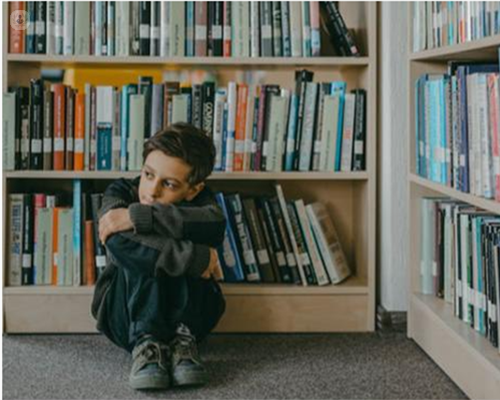Depression in children and young people: Key insights
Written in association with:Depression is a serious mental health condition that can affect anyone, including children and adolescents. It's more than just feeling sad; it's a persistent feeling of sadness or loss of interest that interferes with daily life. Dr Emily Hale, an esteemed Clinical Psychologist, sheds valuable insights on depression in children and young people, including the causes and signs to look out for, in this informative guide.

What is depression?
Depression, in simple terms, is an overwhelming feeling of sadness and hopelessness that lasts for an extended period. It affects how you think, feel, and handle daily activities.
What are the signs of depression in young people?
Depression might present itself differently in young people and children. They might become irritable, excessively worried, or complain of physical problems such as stomach aches or headaches. Sometimes, the signs of depression might be mistaken for 'just being a teenager'. It's important to recognise these signs and seek help if you suspect you or a loved one is suffering from depression.
- Change in Feelings: They might seem sadder than usual, or they could be more irritable and grumpier. It might feel like they're wearing gloom tinted glasses that make everything look less fun and more miserable.
- Losing Interest: Activities, games, or sports they used to love don't make them smile or get excited anymore. It's like their favourite toys or hobbies have lost their colour.
- Energy Levels: They may feel tired all the time, like someone turned down their energy settings. They might move more slowly or just want to sit and rest. This might not go away even if they have had a good night's sleep.
- Appetite Changes: Some kids eat a lot less when they're down. Others might eat a lot more. You might think of it like their regular mealtime routine has been flipped upside down.
- Sleep Changes: They could have trouble falling asleep or wake up in the middle of the night and can't get back to sleep. Or, they might sleep a lot more than usual, as if their bed is like a magnet that keeps pulling them back.
- Feeling Useless or Guilty: They might say things that show they don't feel good about themselves. It's as if they're carrying around a heavy backpack of unhappy thoughts about themselves.
- Aches and Pains: Sometimes they might feel more aches and pains, like headaches or a tummy ache when there's no clear reason for it.
- Talking About Death or Hopelessness: In some situations, they might make comments about not being around anymore or that nothing really matters, this needs to be taken seriously and is a bit of a red warning light.
What can cause depression in young people?
There is no single cause of depression; it's often a combination of genetic, environmental, and psychological factors. Traumatic life events, family history of depression, chronic illness, or ongoing stress can contribute to its onset.
When should you seek advice and/or support for depression?
It's important to know that everyone feels sad or grumpy sometimes, and that's okay! But if a child or teenager feels this way a lot, for more than a couple of weeks, they might need extra help. Understanding depression in young people often requires professional evaluation, as the condition may be masked by behavioural issues or emotional volatility that can be mistaken for typical child and teenage behaviour. If you or someone you know is experiencing symptoms of depression, it's important to seek help. It's not a sign of weakness but a brave step towards feeling better.
What strategies can help?
It's important that any treatment plan for depression in young people is tailored to the individual and may include a combination of the strategies outlined below:
1. Professional Therapy:
- Cognitive Behavioral Therapy (CBT): Helps in identifying and changing negative thought patterns and behaviours. Some young people might prefer to do this in a self-help format using a workbook/online app or some may prefer to do this with a trained therapist.
- Interpersonal Therapy (IPT): Focuses on improving communication skills and relationships.
- Family Therapy: Addresses family dynamics that could contribute to the child's depression.
- Group Therapy: Allows sharing experiences, learning from peers.
2. Medication: In some cases, particularly with moderate to severe depression, antidepressants may be prescribed by a child psychiatrist.
3. School Involvement: Collaborating with school counsellors and teachers to address academic pressures or bullying and to provide a supportive educational environment.
4. Lifestyle Changes:
- Regular Exercise: Physical activity can boost mood and provide a positive outlet for stress.
- Nutrition: A balanced diet may improve overall well-being.
- Sleep Hygiene: Adequate, regular sleep is crucial for mood regulation and brain function.
5. Mindfulness and Stress Management Techniques: Yoga, meditation, or deep breathing exercises can help improve mood.
6. Social Support: Encourage participation in social activities and support in building friendships that provide emotional support and decrease isolation.
7. Building Competencies: Developing hobbies, skills, and academic or athletic competencies to increase self-esteem and a sense of accomplishment.
8. Digital Well-being: Monitoring and limiting screen time, especially exposure to social media that may contribute to depressive feelings.
9. Positive Parenting Strategies: Providing love, support, positive reinforcement and attention to a child’s emotional needs.
Remember, it's okay not to feel okay. Young people and families are not alone, and help is available. Together, we can work towards better mental health for all young people.
If you think you may be experiencing depression or are concerned about a loved one, schedule a consultation with Dr Hale by visiting her Top Doctors profile.


